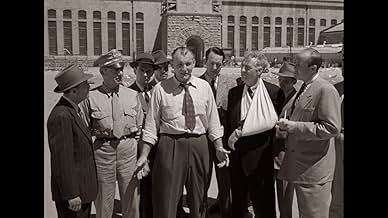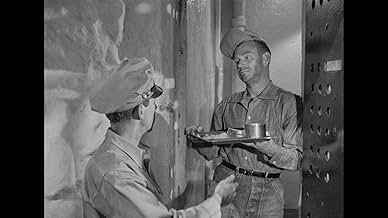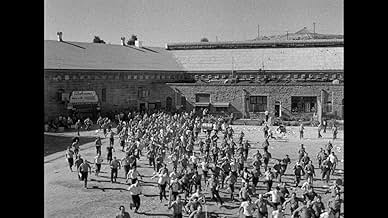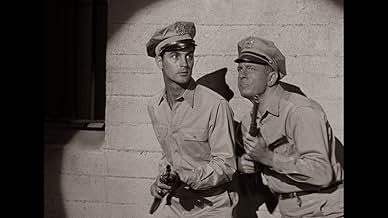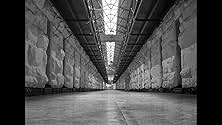Füge eine Handlung in deiner Sprache hinzuFed up with the inhumane prison living conditions, a general prison riot breaks out, leading to hostage-taking, a stand-off with the guards and eventual negotiations with the prison administ... Alles lesenFed up with the inhumane prison living conditions, a general prison riot breaks out, leading to hostage-taking, a stand-off with the guards and eventual negotiations with the prison administration officials.Fed up with the inhumane prison living conditions, a general prison riot breaks out, leading to hostage-taking, a stand-off with the guards and eventual negotiations with the prison administration officials.
- Nominiert für 2 BAFTA Awards
- 3 Nominierungen insgesamt
Empfohlene Bewertungen
Cell Block 11 in this particular prison is the solitary ward, the place where the toughest cases are assigned. With a pair like Neville Brand and Leo Gordon in that block would you think otherwise.
Anyway to protest the conditions they're in the prisoners led by Brand stage a riot where they take the guards assigned to that block hostage. When Brand is wounded in a quarrel, Leo Gordon takes over leadership and he's belonging in the psycho ward. But he's the toughest guy in the joint and nobody is going to argue with him.
Emile Meyer does a great job as the warden who is a decent and compassionate individual trying to affect a few reforms. His pleas fall on deaf ears because then as now, convicts don't have any votes and by definition they are an anti-societal group. Meyer's humanity is contrasted with that of Frank Faylen who is a political appointee and tries a grandstand play with the convicts that almost gets him killed.
This is as realistic a prison drama as you will ever get. Big accolades go here to Walter Wanger who had an incredible unique perspective of life on the inside and turned it with Don Siegel's help into a great motion picture.
The droning voice-over that opens the movie doesn't bode well: It warns of a wave of riots throughout penitentiaries across the country and even takes us to a criminal-justice convention in Toronto where the topic is aired. But soon we're inside Cell Block 11, part of a run-down, overcrowded institution whose warden (Emile Meyer) has been campaigning for reforms, to no avail. (Standing up for convicted criminals, then and now, is political suicide.) When opportunity knocks, the inmates take over the asylum. What they want is press coverage of their quite moderate demands: More elbow room, separate facilities for the mentally ill among them, job training. But they've taken guards as hostages, and threaten to execute them if their demands aren't met.
Leader of the rebels is Neville Brand, who tries to negotiate in good faith, but Meyer has one hand tied behind his back by Frank Faylen, a hard-line state bureaucrat. Brand, too, has trouble keeping the prisoners in line, particularly those who see the riot less as a cause than as a chance for some cheap thrills. Siegel manages to keep the story taut within the claustrophobic confines of the prison and without too much in the way of splashy incident, until he brings it to a surprisingly rueful end. Somehow, he has managed to make an issues movie told almost solely through action.
Siegel's career proved that he had more sides to him than he's generally known for. He started out cutting montages in other directors' movies (Blues in the Night and The Hard Way among them); when he moved into directing, his early work showed range in style and tone: The period thriller The Verdict, the light-hearted noir The Big Steal, the eschatological drama Night Unto Night. Too bad we can't remember him by saying that he just got better and better, because, unfortunately, it just isn't so.
If I have a complaint about the movie, it would be that none of the characters are really examined deeply. I would have liked to have learned more about some of the ringleaders of the riot, as well as some of the guards. Though such deeper examinations might have made the movie much longer than the lean yet efficient eighty minute running time, and the movie might have dragged. But that's a minor problem; the movie as a whole works very well.
When the film begins, there is a preachy prologue about prison riots and how they are the fault of the politicians and the people for allowing prisons to become that rotten. While to some extent this is true, the message come on about as subtly at a baseball bat against your skull. Then the film begins, a fictionalized account of prisoners rioting at a prison and the ineffectiveness and duplicitous nature of public officials in dealing with it. Again and again, the Warden advises for restraint and seems very much in agreement with most of the prisoners' demands...and time and again, the powers that be think the best way to handle the prisoners is to bluster and lie.
So if the film comes off as a bit preachy, why do I still give it a 7 (and I was tempted to give it an 8)? Well, the acting is really terrific. Neville Brand is great as the prisoner in charge of the rioters and the rest of the actors did a really nice job. Had the message been toned down a tad, the film might have earned a 9.
The prisoners make their demands known, and they want them printed in the papers for all the public to see. They want to be involved in a work program instead of sitting idle; they want the jail to be less crowded and better organized. If their needs are not met, guards will be killed, and the blame will be placed on the penal system authorities. The liberal warden of the prison actually wants to grant their demands, but his budget is constrained by politicians far removed from the system, and thus he is helpless as the clock ticks down.
The film is non-stop excitement and drama. I liked seeing the relationship between the prisoners, and their roles in the revolt. Neville Brand, with a gravelly voice and a build like a Sherman tank, is perfectly cast as the group leader and negotiator.
The movie is based on a story of an actual prison riot in the 1950s, and producer Walter Wanger's experiences as an inmate. Isn't it odd that celebrities get religion on the issue of prison reform AFTER they have been behind bars? Dan Rostenkowski comes to mind too.
Wusstest du schon
- WissenswertesLeo Gordon had served five years for armed robbery at San Quentin State Prison. For this reason, Heinze, the Folsom warden, originally objected to Gordon appearing in the film, but director Don Siegel was able to convince him that Gordon was no threat to the prison.
- PatzerWhen the state police force the convicts back into the prison by launching a barrage of tear gas at them, the police move forward, into the area being bombarded. The convicts are overcome by the gas, but the police aren't - even though they're not wearing gas masks and are enshrouded by the same gas the convicts are.
- Zitate
Warden Reynolds: I promise you no harm will come to you during this conversation. Guard! These are my instructions. Dunn is to be allowed to come into this yard and return to 11 without interference.
- Crazy CreditsThe following acknowledgment appears after the opening credits: "We wish to thank Mr. Richard A. McGee and his staff of the California Department of Corrections, Warden Heinze, Associate Warden Ryan, Correctional officers and the inmates of Folsom Prison for their co-operation."
- VerbindungenEdited into Straße des Terrors (1955)
Top-Auswahl
- How long is Riot in Cell Block 11?Powered by Alexa
Details
Box Office
- Budget
- 298.780 $ (geschätzt)
- Laufzeit
- 1 Std. 20 Min.(80 min)
- Farbe
- Seitenverhältnis
- 1.37 : 1

